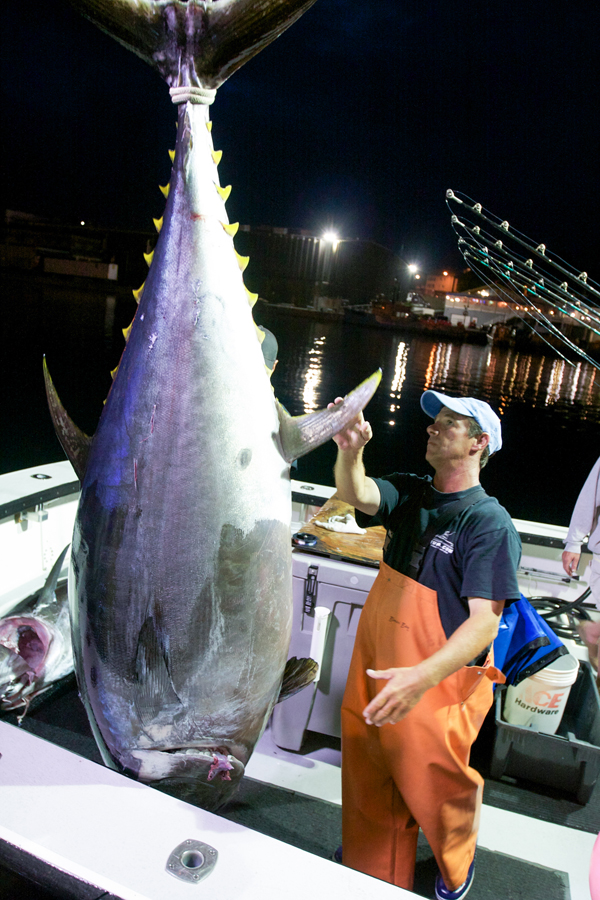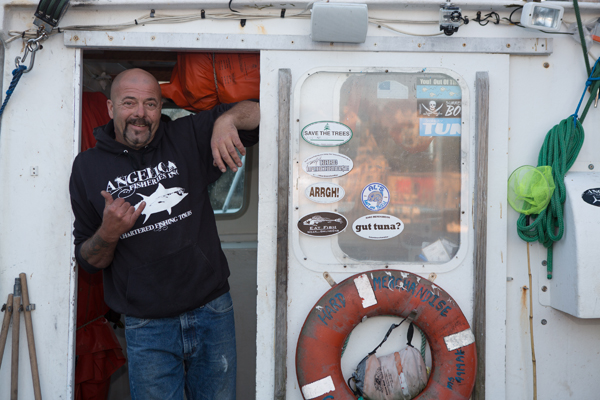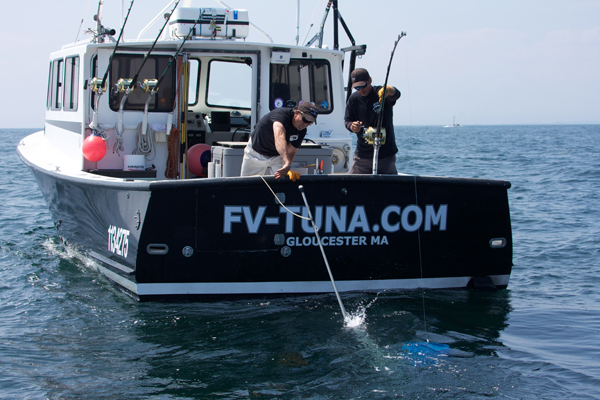‘Wicked Tuna’ Splashes Back to TV: Q&A with the Show’s Star Captains from Gloucester
 First Mate Paul Hebert on the FV-Tuna.com. (All photos courtesy of National Geographic Channel)
First Mate Paul Hebert on the FV-Tuna.com. (All photos courtesy of National Geographic Channel)
This Sunday, January 13, National Geographic will premiere the second season of Wicked Tuna, a program following fishermen based out of Gloucester, Mass., as they take on great excitement and sudden danger off the coast of the North Atlantic in pursuit of the bluefin tuna. With the livelihood of their families at stake alongside the impeding threat of overfishing, these men and women had to duke it out at sea in a battle to hook the very best fish in just 14 weeks. And while last season’s intense competition reeled in millions of viewers, this season promises to bring forth even more action and will offer a better sense of the unprecedented challenges encountered by these dedicated fishermen.
Wicked Tuna stars and captains Dave Carraro of the FV-Tuna.com and Dave Marciano of Hard Merchandise, both of whom have decades of fishing experience out of Gloucester and fitting Massachusetts accents to match, answered a few of our questions via phone yesterday while they spent a bit of time promoting in the Big Apple. Here’s what they had to say:
What’s the average weight of a bluefin tuna? How much is it typically worth?
Captain Dave Carraro: The average weight of a bluefin tuna, if I had to guess, would be about 500 pounds. But they can be as big as 1200 pounds, and the smallest ones we can keep are around 200 pounds. A 500-pound fish could be worth as little as $1,500 or as much as $20,000. It all depends on just basic economics, supply and demand, and another big factor is the quality of the fish.
 Captain Dave Marciano on his boat Hard Merchandise.
Captain Dave Marciano on his boat Hard Merchandise.
Describe the catching process. From the minute you catch something, what do you do with it?
Carraro: After we catch a fish, we dress it out. We basically take the head off, take the contents out, cut some of the bigger fins off, and we cover it in ice below the deck so we keep it as cold as possible. The better you take care of your fish, the more money you’re gonna get. After we come back to the dock, our buyer is waiting for us with a big white box truck. From there it goes to his processing plant, where they clean up the fish a little more. Most of the fish go to Japan, however, about 5 percent will be kept here for the domestic market. It will either ship out to Boston, California, or New York.
After watching the first season of Wicked Tuna, do you think your average day at sea is portrayed accurately?
Captain Dave Marciano: I think the actual fishing days you see are accurate. What’s really hard to get a sense of is that if you watch the show, it looks like we’re just out for the day. The viewer really doesn’t see that most of the time we’re out for multiple days at a time. Sometimes it looks like we’re out for a six-hour cruise when in reality, we were out for four to five days. This year, I think they’re trying to give the viewers a better understanding that we’re out for multiple days by showing us laying down, getting up for breakfast, cooking dinner, then going back down to the bunk.
 FV-Tuna.com in action on season 2 of Wicked Tuna.
FV-Tuna.com in action on season 2 of Wicked Tuna.
What are some of the biggest threats to the bluefin tuna fishing industry right now?
Marciano: There’s no doubt there’s been a lot of overfishing, but you know, this is slowly being corrected. The last few years have been especially good, and on an international front, other countries have started to manage their fisheries much better and much stricter. While they do things we aren’t quite proud of in this country, we are leaders in the world when it comes to fishery management success stories. We take our quota very seriously, and when we catch our quota, we’re done fishing.
Talk a little about the rivalry between fishermen. Is it really as intense as the show makes it out to be?
Marciano: It’s real, and we kind of get along on shore, but the bottom line is: it’s all about money, especially for me. Fishing is my sole source of income for my family. That’s how I put my daughters through school, and my son. When you get out there, we’re talking fish that could be anywhere from $10,000 to as much as $20,000, for one fish. So when you’re talkin’ that much money, yeah, we seem to get along fine on shore, but when you get out there, and there’s that kind of paycheck involved, the elbows go up. It’s human nature.
Are there days when you come home with nothing?
Carraro: We’re allowed to catch about three fish per day, so after we catch one fish, we really don’t come in until we’ve exhausted all of our fuel, all of the provisions, you know. We try and catch three per trip, but that doesn’t always happen. Most of the time we come back with just one.
Marciano: Oh yeah, and that’s a big part of tuna fishin.’ They kind of touch on it [on Wicked Tuna]. A lot of that is edited out because it wouldn’t be that exciting. If they showed the days where absolutely nothing happened, it’d be about as exciting as watching grass grow. So it’s all about the epic highs and epic lows, but there is a lot of down time in between, and that’s part of what it takes. I guess if there’s a secret, it’s putting a lot of time in. A lot of times on the show it shows us doing things a day at a time, but in real life we’re out there without coming home for three days or even five days, and on occasion, even after that much time, we come home empty. We just hope that the next time we go out, we can make up for it. It’s one of the hard things about being a fisherman. Sometimes it gets very stressful on the home front when we don’t know where the next check is coming for groceries.
What’s the most important aspect of the show, especially for viewers who do not know much about the industry?
Marciano: I think we’re bringing awareness to a fishery that a lot of people didn’t know existed, which is really cool. I’ve taken this fishery for granted for all these years. I guess people don’t know that these fish get that big, or much about the fishery that’s right in their backyard. And then on an international front, it’s bringing awareness to the bluefin tuna, and we definitely want to pay attention. On a personal level, I certainly wouldn’t like to see these fish go away. I think we are conferencing that goal really well. We are finding that balance between having a healthy fishery for fishermen like me and others on the show to participate in, and we’re slowly rebuilding while we do it, so it’s kind of a win-win scenario.
What’s the most dangerous situation you’ve run into out at sea?
Carraro: Keep in mind, we’re in very, very little boats. It’s not like the Deadliest Catch’s ships. We call our boats Clorox bottle boats because they are very light and get bumped around. We were coming in one night off of Nantucket Island, fishing about 60 miles deep, the boat faced a 15- to 18-foot wave, and turned sideways. The wave collapsed on the boat, blew out all of my side windows, and completely filled the cockpit with water. We were fortunate enough to be able to get the fish door open, so we opened up that door to let the water stretch out the back before the boat sank. So just like that, we thought we were going under. We almost flipped over. Anything can happen, and very, very quickly.
Marciano: The bottom line is, we spend a lot of time out there, and you know, our boats have limitations. On occasion, even in spite of my experience and using all the tools we have to predict the weather, we get caught in weather that is really inappropriate for a boat that size to be in. There’ve been a couple of times over the course of my life when I was questioning what I was doing there. I lost a boat on January 13, 2003, the first boat I owned. We sank 20 miles out at sea, coming home from fishing that day. The boat sank in 33 minutes from the time I notified the Coast Guard to the time I told them we were abandoning ship.
So it takes a lot of guts, huh?
Marciano: I mean, I think it’s more passion than guts. Yeah, people say it’s hard because you fish all winter, and it’s cold and rough and windy, but the bottom line is that I love my job. In this day and age, I do wish I made a lot more money because I do have kids and I’d like to spoil them, but somehow we always seem to have what we need. This day and age, if you can make a living and enjoy your job, life isn’t all that bad.
Wicked Tuna Season 2 will premiere this Sunday, January 13, at 9 p.m. on the National Geographic Channel. For more information, visit natgeotv.com/wickedtuna
Correction, January 14, 2:48 p.m.: The top photo is of First Mate Paul Hebert, not Captain Dave Carraro, on the FV-Tuna.com. We regret the error.


